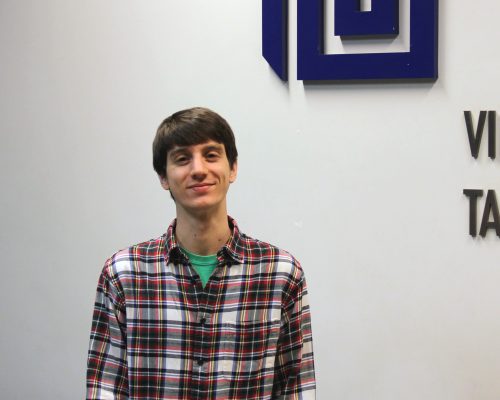
Matthew Vincent
Student of IIRPS VU Eastern European and Russian Studies master's programme
Why did you choose Vilnius and Eastern European and Russian studies MA program at IIRPS VU?
Well, I have always liked living in a culture as a means to study it. For me, I see no better way to study Eastern Europe but in the region itself. In this sense, I chose to study EERS at Vilnius because the Lithuanian experience is as a crossroads between North, Central, and Eastern European. This experience is visible in many different perspectives that can only be observed here, from the architecture and the city planning to simply how people behave every day.
Matt, your previous studies are mostly related to languages and linguistics, why did you decide to study political science? What part of your studies do you enjoy the most?
That’s right, my primary focus at university was German language and culture, with some linguistics and other foreign language classes. I have found that political science overlaps with my former studies through their roots in sociology. That language affects its society and vice versa is totally inevitable, so for me political science and language are interrelated subjects. So far, I have really enjoyed the dialogue that my colleagues and professors have in our classes. There’s a lot of exchange of different ideas and perspectives, and everyone comes from various backgrounds.
You have spent some time in Russia and Ukraine. What kind of experience was it? And why did you decide to go and live in these countries?
Honestly, the decision to move to Ukraine was made for me by the US Peace Corps. After university, I volunteered to teach English in Ukraine for 27 months, and ended up living there for only 6 months before being evacuated in 2014 because protestors had started to occupy transportation. My experience until evacuation was so intriguing and wonderful, but I was left with a profound sense of unfinished business. That’s why I decided to teach English in Saint Petersburg for a couple years, so as to better understand the Russian condition and language.
We know that you are writing a blog about the region. How did it all start? What was the most exciting thing about Eastern Europe or Russia?
At university, I took a few writing courses because I have always enjoyed writing since a young age. So when one of my roommates started a blog about his experiences in China, I naturally decided to do the same thing. In my opinion, the most exciting part about Eastern Europe or Russia is the ability to watch the rebirth of regional identities before your eyes. It’s difficult to understand Eastern Europe through reading history. Actually living here, in the middle of it, allows you to make so many more observations than you can with just the words of a book. If you want to know more about these observations, you can find my blog here.
You have been here for more than few months, what are your impressions?
Lithuania is awesome. The language (the oldest living European language, as everyone will say) is very curious and I really like the murals to be found around Vilnius. Every once in a while, I find a new secret mural hidden in a courtyard somewhere. Also, I appreciate the smaller city atmosphere of Vilnius, which is a relief on getting around. I really feel quite comfortable here and as odd as it sounds, I’m looking forward to some more snow.
What are your future plans after the graduation?
After graduation, I hope to find my way into the fields of democratization or international security. I am not sure if I can be more specific than that yet, but I believe I will understand better after I have taken a few more courses. I have kind of always wanted to live in Germany, so I think I will wait to see where these two interests converge.







